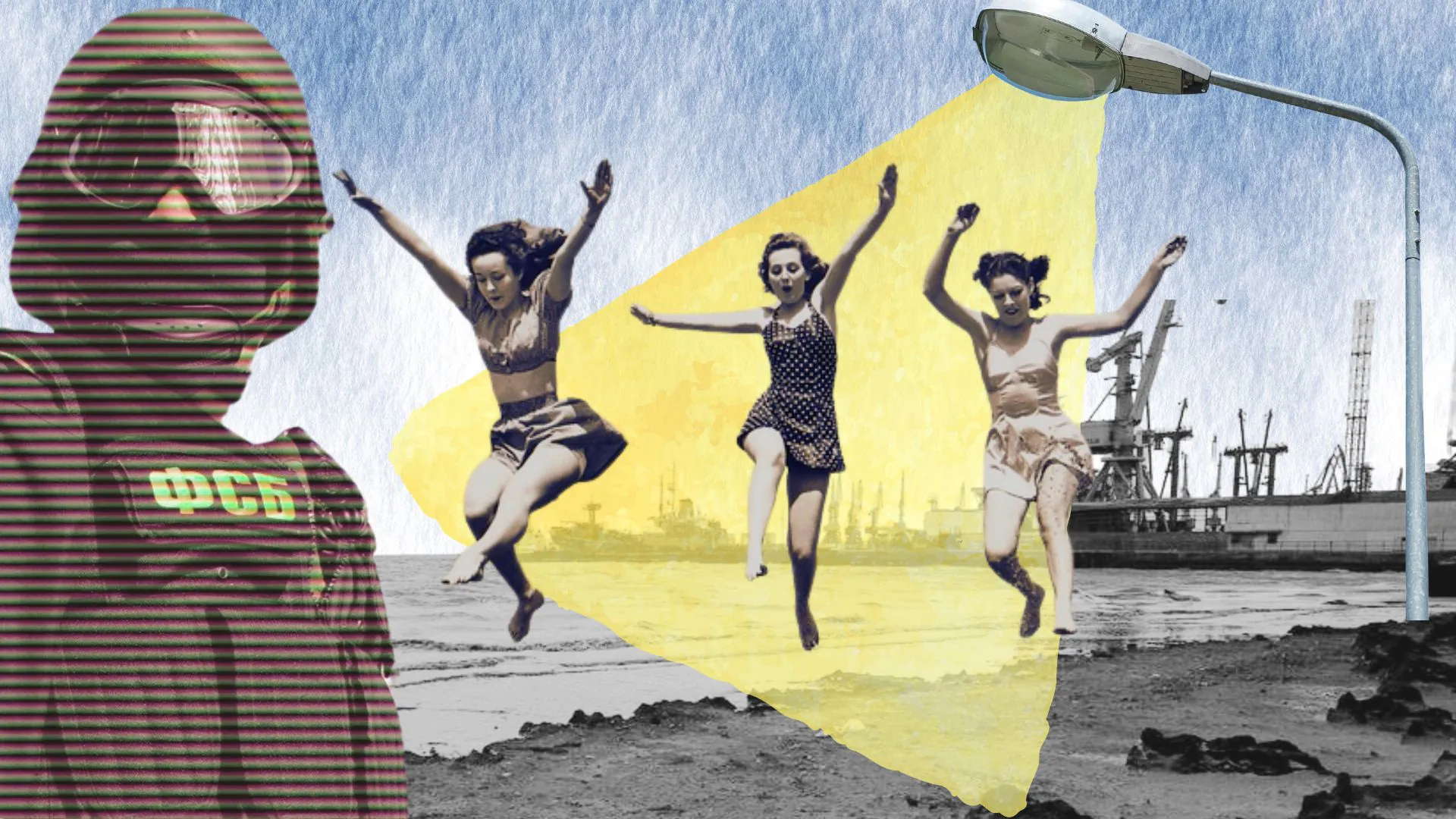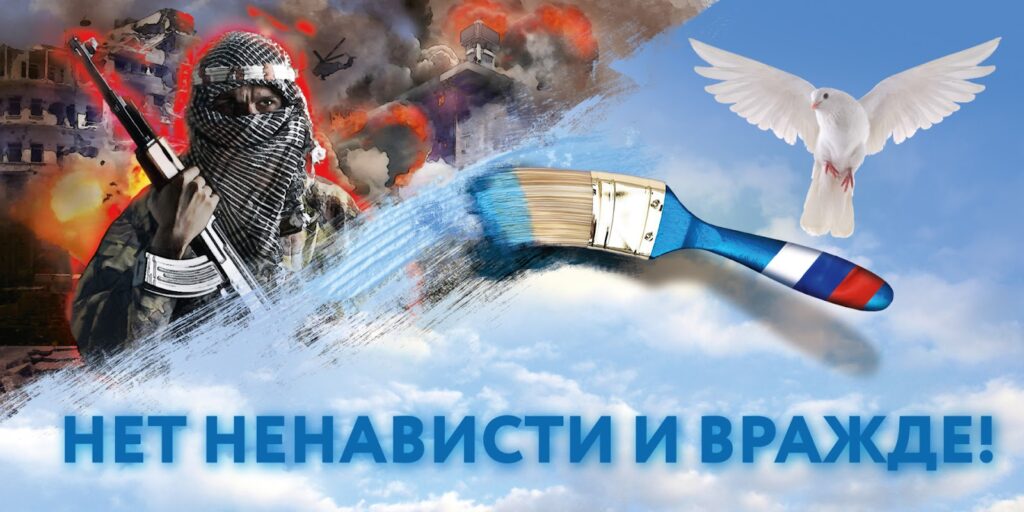

Surveillance, punitive psychiatry and xenophobia: how Moscow “counters extremism”
In mid-November, in Russia and the Ukrainian territories it occupies “operational and preventive” measures called “No to Hatred and Hostility” were carried out.
The events, allegedly aimed at preventing extremist activities and shaping citizens’ negative attitudes towards radical movements, were also held in educational institutions.
Another goal of the events was to “promote inter-ethnic and inter-confessional harmony and education in the spirit of patriotism”, Realnaia Gazeta reported.
Russia is a white dove of peace
As part of the campaign, flash mobs, meetings, and lectures were held throughout the country and in the Russian-occupied territories of Ukraine. Children were involved in drawing competitions and even visits to police stations. Media reports about these events were illustrated with pictures of doves and clear skies, meaning, no to war.

Such events are held annually in Russia, and their organisers claim that “extremism and terrorism are dangerous, both for the international community as a whole and for Russia in particular”.
During the events, children are urged to be vigilant when using social media and not to distribute materials that “can incite hatred or hostility, as well as not to leave comments that justify the actions of extremists”:
“It is important for young people to understand that extremism can manifest itself not only in violent acts but also in the spread of hateful ideas through social media and other platforms.”
According to Anton Naumlyuk, a journalist, historian and human rights activist from Russia, Russian state agencies have long been monitoring and controlling the mood in schools and universities. Employees of the Centre for Countering Extremism of the ministry of internal affairs and the FSB were assigned to educational institutions to monitor the mood of students.
“Until 2014, this system was only a surveillance system, and then it became a system of control and imposition and began to interfere with the educational processes,” Naumliuk said.
He added that much attention is now being paid to tracking manifestations of disloyalty: posts on social media with anti-war sentiments, statements condemning the actions of the Russian army, etc.
According to him, not only pupils and students but also teachers and professors are monitored.
“There are several cases in Russia where teachers were persecuted because students or their parents complained about them after they said something insufficiently patriotic or anti-war. There were such cases in Crimea as well,” Naumliuk said.
In his opinion, numerous “patriotic” public events in Russia are held to demonstrate the “right” sentiments.
“This is a kind of public censorship that also shapes public opinion. That is, a person sees, for example, how in a school, they open “desks of the heroes of the SVO”, memorial plaques to the fallen Russian military. Those who see this are well aware that it is dangerous to oppose this trend,” Naumliuk noted.
Punitive psychiatry is back
Those who do not follow the trends are declared extremists. In occupied Mariupol, the police reported that 263 people are registered with the juvenile affairs units of the Donetsk “republic,” 16 of them for actions of an “extremist nature.” Criminal proceedings were brought against 161 minors, 48 of whom were sent for compulsory psychiatric treatment.
This means that Russia still has punitive psychiatry, as did the USSR, where dissidents were sent to psychiatric hospitals for compulsory treatment.
Anton Naumliuk said that in Russia, they do not see anything extraordinary in such measures, because they are taken following the law.
“When I was working in journalism in Russia, before 2012, I observed cases when children who were misbehaving, causing problems for teachers and police, were forcibly sent for mental health checks,” he said.
“They can call any non-mainstream, unpatriotic or anti-war statement a sign of illness. That is, anything that goes against the state policy, especially regarding Ukraine and the war,” Naumliuk said.
In his opinion, such measures help to suppress even verbal manifestations of disloyalty to the regime, on the one hand, and to make dissidents look like mentally ill marginalised people, on the other.
In search of terrorists and saboteurs
The ATK-Novorossiya Telegram channel contains a lot of information about the detention of people, including those from the occupied territories, on charges of terrorism and extremism.
For example, one can watch a video of two security forces twisting and throwing a woman crossing the road onto the pavement. Or the bending of the arms of a pensioner in his home.

Then people are taken to a “court” that passes sentences with prison terms. For example, a 49-year-old resident of occupied Melitopol was accused of publicly calling for terrorist activities: she allegedly wrote a comment on a social media platform in which she “called for violent actions against the leadership, military and citizens of the Russian Federation.” The woman was sentenced to 5.6 years in prison.
There are many such and similar messages. They are intended to intimidate people and prevent acts of disobedience. People are detained for supporting Ukraine both in the occupied territories of Ukraine and in Russia.
Anton Naumliuk says that Putin’s regime has also recreated an atmosphere of distrust and snitching in Russia.
“Most of the court cases on discrediting the Russian army or treason are based on denunciations. Some inform on teachers who condemn the killing of civilians and the waging of an aggressive war. Some inform on people who listen to Okean Elzy in their cars,” he said.
Non-Russians under Moscow rule
Along with the “prevention” of terrorism and extremism, Russia and the territories it occupies talk about countering “attempts by Western political forces to split society along ethnic lines” and xenophobia.
In Luhansk, where the ethnic composition of the population changed after representatives of Russian ethnic groups and Central Asians moved there, a meeting was even held with the leaders of religious organisations.
“Our main goal is to prevent violence in interfaith relations, peace on our territory depends on it,” said the chief of the administration of the Luhansk “republic” head Alexey Samoilov.
Like everything else, respect for other nationalities is understood in Russia in its way.
Anton Naumliuk said that the Russian state has always had a prejudiced attitude towards other ethnicities, also in Russia. After the terrorist attack in the Crocus City Hall, these trends have intensified.
“It seems that the authorities have decided to use the public fear of terrorist attacks and the grassroots xenophobia that has always existed in Russia to exercise more control over people’s moods,” Naumliuk said.
He noted that Russia has adopted chauvinistic decisions at the legislative level to deport workers who used to come from Tajikistan, Uzbekistan, Kyrgyzstan and other Central Asian countries over the years.
The rhetoric used by MPs and officials is also getting tougher. All this supports xenophobic sentiments among Russians.
“Everything has merged and looks like a huge ideological canvas of hatred for everything foreign. They hold “days of tolerance,” calling Russian chauvinistic nationalism tolerance so that everyone nearby becomes more Russian than the Russians themselves,” Naumliuk concluded.